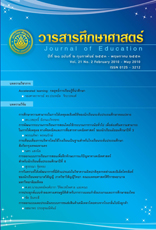การตรวจสอบโมเดลอิทธิพลของตัวแปรกำกับที่มีการส่งผ่านของพฤติกรรมจริยธรรมของนักเรียนระดับมัธยมศึกษา
คำสำคัญ:
อิทธิพลตัวแปรกำกับที่มีการส่งผ่าน, พฤติกรรมจริยธรรม, Mediated Moderation effect, Moral Behaviorบทคัดย่อ
บทคัดย่อ
การวิจัยครั้งนี้ มีวัตถุประสงค์เพื่อตรวจสอบอิทธิพลปฏิสัมพันธ์ระหว่างปัจจัยด้านจิตลักษณะและด้านสถานการณ์ ที่มีต่อพฤติกรรมจริยธรรมผ่านปัจจัยด้านจิตลักษณะตามสถานการณ์ของนักเรียนระดับมัธยมศึกษา ตามแนวคิดของทฤษฎีรูปแบบปฏิสัมพันธ์นิยม ทฤษฎีพัฒนาการทางจริยธรรม และทฤษฎีต้นไม้จริยธรรม กลุ่มตัวอย่างคือ นักเรียนระดับชั้นมัธยมศึกษาปีที่ 3 จำนวน 741 คน ในโรงเรียนสังกัดคณะกรรมการการศึกษาขั้นพื้นฐาน กระทรวงศึกษาธิการ จังหวัดนนทบุรีและปทุมธานี เก็บรวบรวมข้อมูลโดยใช้แบบสอบถามแบบมาตรประมาณค่า 5 ระดับ จำนวน 97 ข้อ ตัวแปรที่ใช้ในงานวิจัยประกอบด้วย
ตัวแปรแฝง 5 ตัว และตัวแปรสังเกตได้จำนวน 18 ตัวแปร แต่ละตัวมีค่าความเที่ยงอยู่ในช่วงพิสัย 0.819-0.917 และมีความตรงเชิงโครงสร้าง การวิเคราะห์ข้อมูลพื้นฐานใช้สถิติพื้นฐาน และการวิเคราะห์โมเดลอิทธิพลของตัวแปรกำกับที่มีการส่งผ่านด้วยโปรแกรม LISREL
ผลการศึกษาที่สำคัญแสดงให้เห็นว่า โมเดลอิทธิพลของตัวแปรกำกับที่มีการส่งผ่าน มีความสอดคล้องกับข้อมูลเชิงประจักษ์ มีค่า Chi-square = 82.294, df = 67, P = 0.099, RMSEA = 0.018, RMR = 0.012, GFI = 0.988, AGFI = 0.969, CFI = 1.000 ตัวแปรสาเหตุร่วมกันอธิบายความแปรปรวนในพฤติกรรมจริยธรรมและจิตลักษณะตามสถานการณ์ได้ร้อยละ 85.914 และ 79.177 ตามลำดับ ทั้งนี้ เทอมปฏิสัมพันธ์ระหว่างด้านจิตลักษณะกับด้านสถานการณ์มีอิทธิพลทางตรงทางบวกเท่ากับ 0.271 ต่อพฤติกรรมจริยธรรมอย่างมีนัยสำคัญทางสถิติ แต่มีอิทธิพลทางลบเท่ากับ -0.147 ต่อทัศนคติต่อพฤติกรรมจริยธรรมอย่างมีนัยสำคัญทางสถิติ และทัศนคติต่อพฤติกรรมจริยธรรมมีอิทธิพลทางบวกเท่ากับ 0.235 ต่อพฤติกรรมจริยธรรมอย่างมีนัยสำคัญทางสถิติที่ระดับ .01 โดยอิทธิพลจากเทอมปฏิสัมพันธ์ในโมเดลอิทธิพลของตัวแปรกำกับที่มีการส่งผ่านมีค่าต่างเล็กน้อยจากค่าในโมเดลอิทธิพลของตัวแปรกำกับที่ไม่มีอิทธิพลของตัวแปรส่งผ่าน ผลการวิเคราะห์แสดงว่า ทัศนคติต่อพฤติกรรมจริยธรรมเป็นตัวแปรส่งผ่านในโมเดลตัวแปรกำกับที่มีการส่งผ่านของพฤติกรรมจริยธรรม
ได้รับทุน 90 ปี จุฬาลงกรณ์มหาวิทยาลัย กองทุนรัชดาภิเษกสมโภช
An investigation of Mediated Moderation effect model of Moral Behavior of secondary students
Orn-uma Charoensu
Abstract
This study aimed to investigate interaction effect between psychological traits and situation factors on moral behavior mediated through organismic interaction factor of secondary students, based on three theoretical concepts of Interactionism model, Moral Development Theory and Moral Tree Theory. The research sample consisted of 741 grade 9 students from schools under the Department of Basic Education, Nonthaburi and Pathumthani provinces. This model consisted of 5 latent variables and 18 observed variables. The research instruments were 97 items of 5-level rating scales with reliabilities range from 0.819-0.917 and good construct validity. Data analyses were descriptive statistics and the validation analysis of the mediated moderation effect model using LISREL program.
The major finding was as follows: the mediated moderation model fitted to the empirical data with Chi-square = 82.294, df = 67, P = 0.099, RMSEA = 0.018, RMR = 0.012, GFI = 0.988, AGFI = 0.969, CFI = 1.000 and the explained percentages of variance in moral behavior and organismic interaction factor were 85.914 and 79.177 respectively. Interaction term between psychological traits and situation factors had positive direct effect of 0.271 on moral behavior but had negative direct effect of -0.147 on organismic interaction factor, the significant direct effect of which was 0.235 on moral behavior. The interaction effect in the mediated moderation effect model had a little bit of differences from the moderation effect model with no mediator. The results, therefore, confirmed that the organismic interaction factor was mediator variable in the mediated moderation effect model.
ดาวน์โหลด
รูปแบบการอ้างอิง
ฉบับ
ประเภทบทความ
สัญญาอนุญาต
ลิขสิทธิ์ของบทความที่ปรากฏในวารสารศึกษาศาสตร์ มหาวิทยาลัยบูรพา เป็นของวารสารศึกษาศาสตร์ มหาวิทยาลัยบูรพา ทั้งนี้บทความทุกเรื่องผ่านการตรวจสอบความถูกต้องทางวิชาการจากผู้ทรงคุณวุฒิ ข้อความและข้อมูลของบทความในวารสารฯ เป็นแนวคิดของผู้แต่ง มิใช่เป็นความคิดเห็นของกองบรรณาธิการ และมิใช่ความรับผิดชอบของคณะศึกษาศาสตร์ มหาวิทยาลัยบูรพา ไม่สงวนลิขสิทธิ์การนำไปใช้ประโยชน์ทางวิชาการแต่ต้องอ้างอิงแสดงแหล่งที่มาและอยู่ในขอบเขตของกฎหมายลิขสิทธิ์



